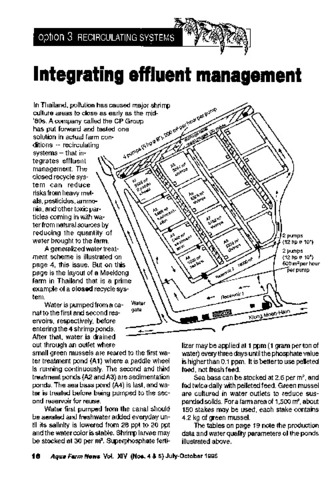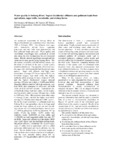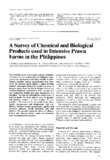Integrating effluent management
- Global styles
- MLA
- Vancouver
- Elsevier - Harvard
- APA
- Help
Share
抄録
The paper discusses a closed recycle shrimp farm in Thailand which integrates effluent management. The closed recycle system can reduce risk of heavy metals, pesticides, ammonia, and other toxic particles coming in with water from natural sources by reducing the quantity of water brought to the farm.
Suggested Citation
SEAFDEC/AQD (1996). Integrating effluent management. Aqua Farm News , 14(4-5), 18-19. http://hdl.handle.net/10862/2434
Type
magazineArticleISSN
0116-6573Collections
- Aqua Farm News [286]
Related items
Showing items related by title, author, creator and subject.
-
Water quality in Imbang river, Negros Occidental: effluents and pollutant loads from agriculture, sugar mills, households, and shrimp farms
Gonzales, Guadiosa A.; Gonzales, Hernane J.; Sanares, Roman C.; Taberna, Evelyn T. (Bureau of Agricultural Research, Department of Agriculture, 2007)An ecological assessment of Imbang River in Negros Occidental was undertaken from December 1992 to February 1995. The effluents from sugar mills, households, shrimp farms, sugarcane plantations and rice fields were ... -
A survey of chemical and biological products used in intensive prawn farms in the Philippines
Primavera, Jurgenne ; Lavilla-Pitogo, Celia R.; Ladja, Jocelyn M.; de la Peña, Milagros R. (Elsevier, 1993)
With attractive prawn export prices and the availability of hatchery fry and commercial feeds, Philippine aquaculture has experienced a shift from milkfish to prawn Penaeus monodon and an intensification from traditional ...
; Lavilla-Pitogo, Celia R.; Ladja, Jocelyn M.; de la Peña, Milagros R. (Elsevier, 1993)
With attractive prawn export prices and the availability of hatchery fry and commercial feeds, Philippine aquaculture has experienced a shift from milkfish to prawn Penaeus monodon and an intensification from traditional ... -
From triphenyltins to integrated management of the 'pest' snail Cerithidea cingulata in mangrove-derived milkfish ponds in the Philippines
The potamidid snail Cerithidea cingulata is considered a pest in brackishwater milkfish ponds in the Philippines and has been controlled by the triphenyltin (TPT) compounds Aquatin and Brestan. But TPT is also toxic to ...






